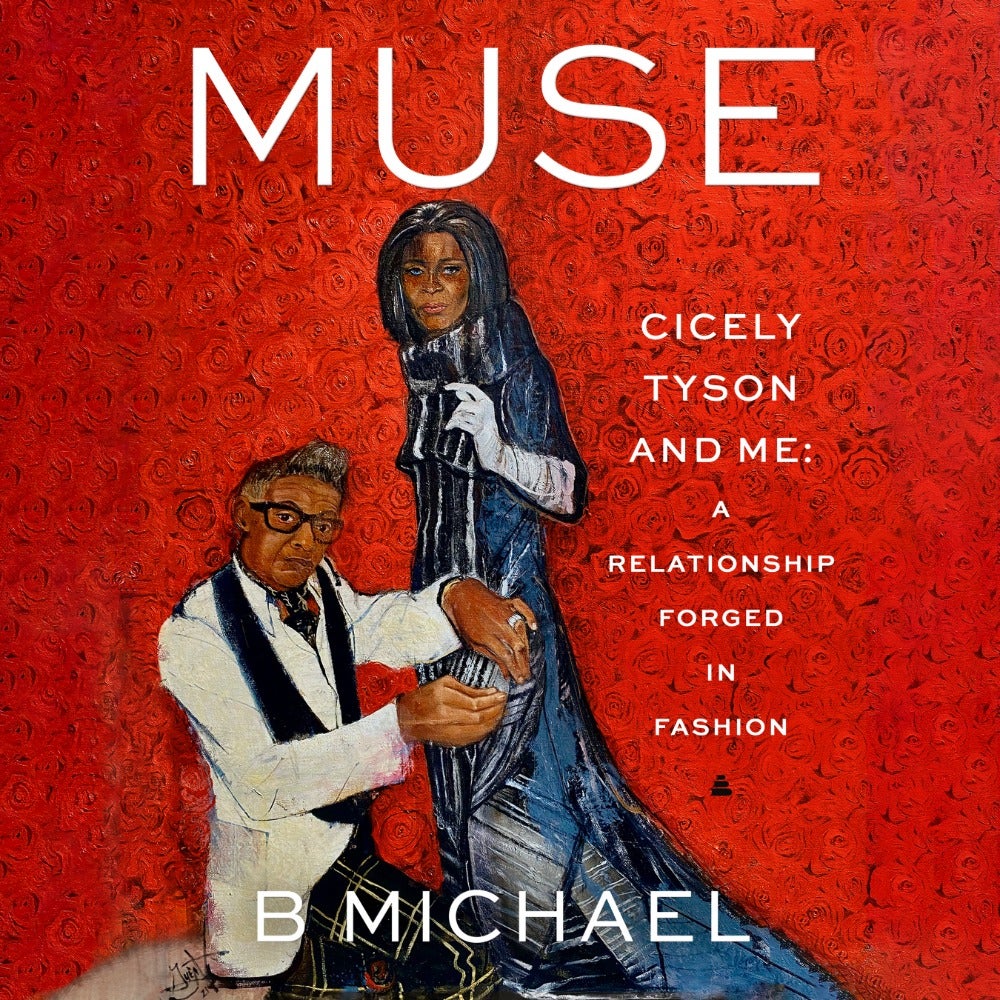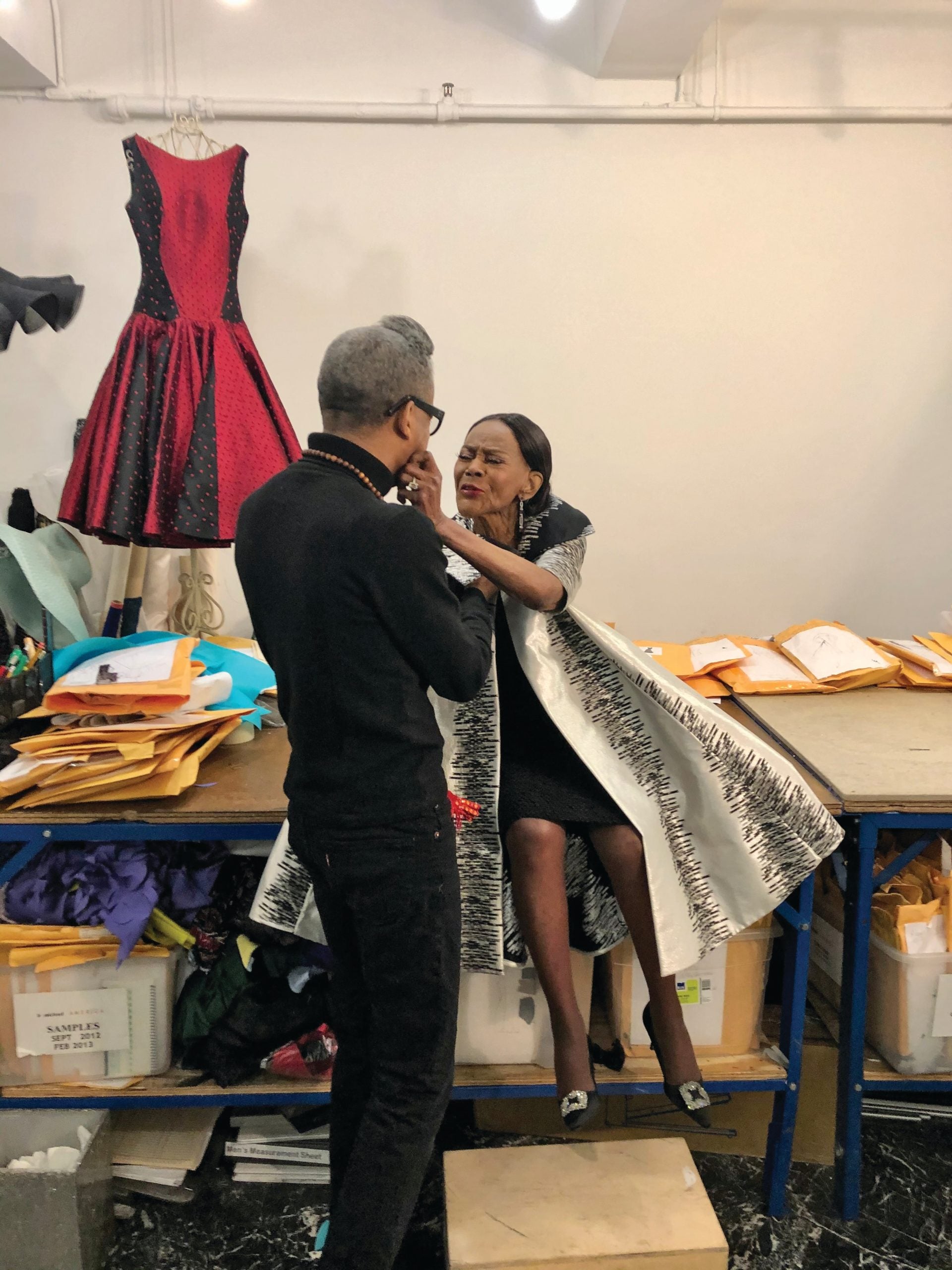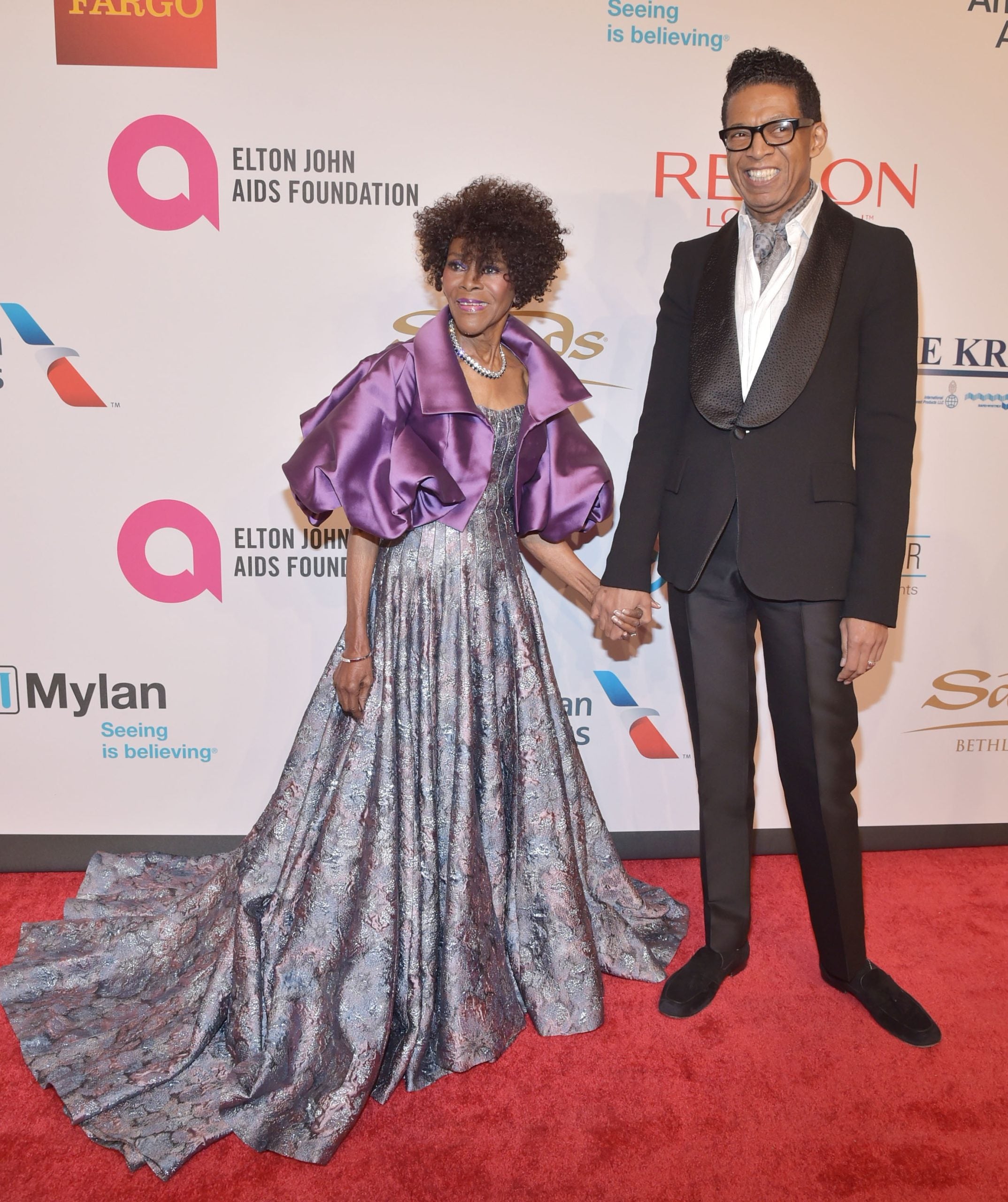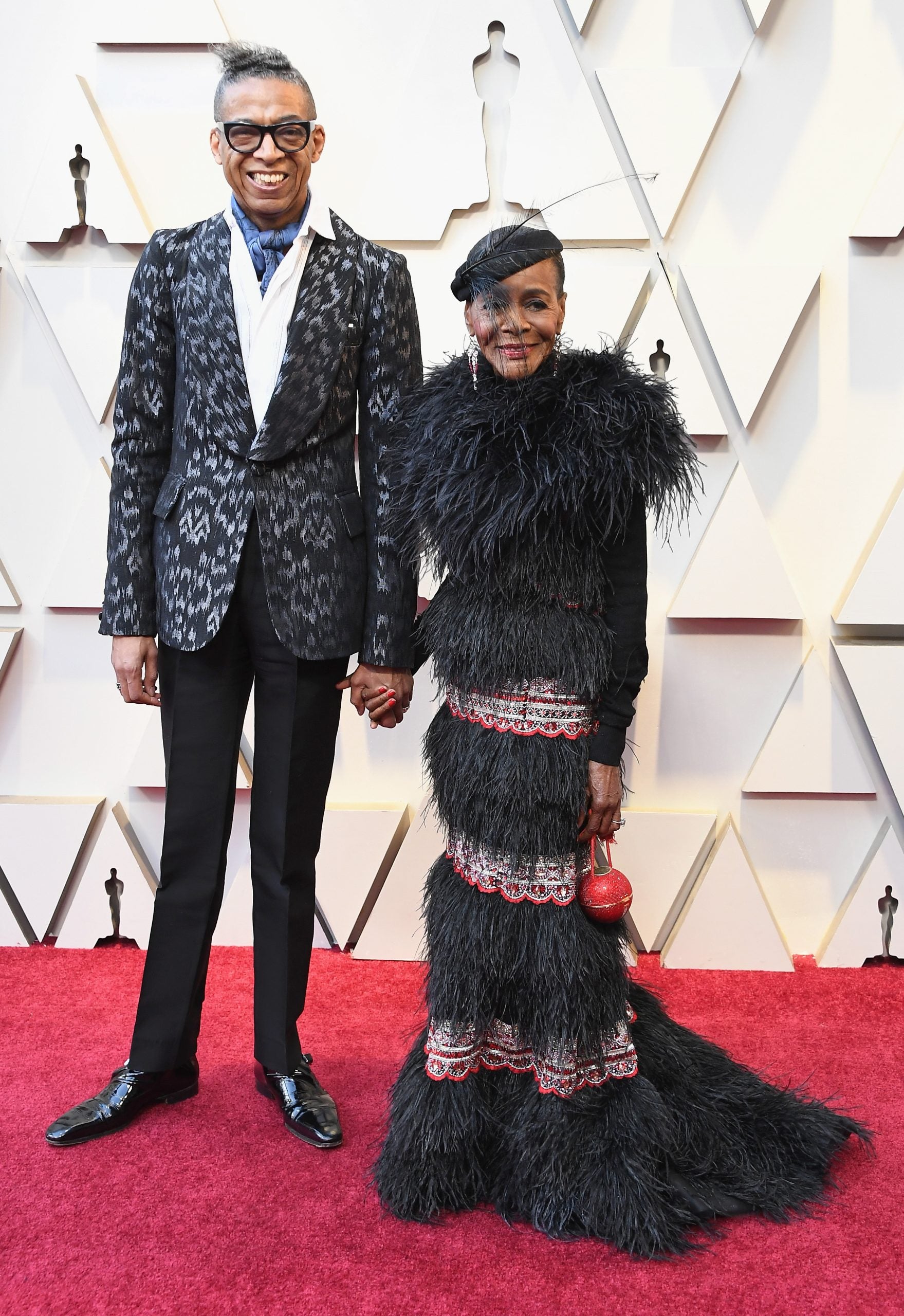
Couture designer B Michael reminisces about a memorable moment with his exuberant fashion muse, legendary actress Cicely Tyson. It happened on the morning of Aretha Franklin’s funeral when Tyson disagreed about the size of a hat he offered, fearing it would block guests sitting behind her. “She gave me some pushback,” he says over a phone call. In response, he remembers telling Ms. Tyson, “I don’t think anyone sitting behind Cicely Tyson is going to complain that they can’t see because of your hat.” He added, “This is Aretha Franklin. She was the queen of soul, and you are the queen of the culture. You have to wear this hat.” According to Michael, she ended up wearing the hat and it was well received by attendees of the funeral.
This story captures the humorous and joyful moments shared by B Michael and Tyson, whom he designed pieces for from age 80 onwards. Introduced in 2005, their bond led to the creation of decadent gowns for historic awards ceremonies the actress attended. Michael compares their friendship and closeness to the iconic duo Audrey Hepburn and Hubert de Givenchy “That really is a visual way to see how we saw ourselves as designer and muse. What’s unique about us is that we had a very spiritual and wonderful relationship,” he notes.
The inspiration for Michael’s new book, Muse: Cicely Tyson And Me: A Relationship Forged in Fashion, directly stems from their kinship. “We recognize that that’s who we are,” says Michael. He expresses that there is always a connection that brings two people together, and fashion is what brought the duo to one another. Their shared excitement for textures and patterns became a significant aspect of their collaboration, allowing them to blend Tyson’s identity with Michael’s creativity.
Ahead of the book release, we caught up with B Michael to discuss the historical memories he shared with Ms. Tyson, his joining the Council of Fashion Designers of America, and more.

ESSENCE.com: What has been the most joyful moment you’ve experienced recently?
B Michael: I am grateful that the book is complete and it’s now finding its way into the world. It allows me to share a narrative and a voice that is part of our history. I’m grateful for the opportunity for that and for all of the wonderful responses we’re getting to it. And that when I am long gone, that narrative will still be part of our history and telling the story.
Can you walk me through how you felt becoming a member of the Council of Fashion Designers of America in 1998?
When I came on the scene as a designer, I never thought of myself as anything except a fashion designer. Then of course you realize that you are a rare breed of an already rare breed as now a Black American designer. That was being told to me, and then I [began] to realize the responsibility of that and the significance of that, it became something and continues to be something that I take to heart and recognize that we have a responsibility for excellence, which we always are, but we also need to make sure that we’re providing a way for those who will follow us. So, I get to be what Arthur McGee was to me. Oscar de la Renta is who sponsored me. That was very significant for me

What was your first moment with Ms. Tyson?
Yes, that’s the moment you’ll always remember. [In 2005] Joey Mills, who was a celebrated makeup artist, especially of his time, called me, and he said that Cicely Tyson was there with him and she wanted to come to see if I could do a dress for her for the upcoming Oprah Winfrey Legends Ball, and that she knew of me because of Susan Fales-Hill. I said, of course. He said, “Well, she’d like to come right over.” So indeed she did. She showed up within 30 minutes or so. I will always remember when I opened the door and there stood Ms. Tyson totally not what I expected. I had only seen visuals of her in films.
Now here stands Ms. Tyson dressed very casually as I describe on the pages of the book. She has a pulley with her, and she comes into the atelier and tells me that this event is in [a few] days and can you dress me? Of course, I had no choice. There it began. That event required black and white, and I put her in a blouse and an evening skirt. She loved the idea that it was eclectic. As I got to know her, that made perfect sense. So that’s how we began. But I will always remember that moment of opening the door and there she stood.

I saw in the book that for Oprah Winfrey’s Legends Ball in 2005, Beyoncé wore the same skirt Ms. Tyson wore for her B’Day album cover, and I just think that that’s such a full-circle fashion moment in a way.
Yes, absolutely. And what I love about that is what they both represent, however, they both represent something very powerful, but they’re very different. As a designer, I like that I can reach both that way. I mean, that makes me feel like that’s what I’m supposed to do. When Ms. Tyson [first] came to me, she was 80, but I didn’t see 80. I just saw this amazing woman. [It’s] the same thing when I see Beyoncé, it’s just an amazing woman. I’m thrilled that I was able to accomplish [what I did] with both of them and one skirt.
What led to Ms. Tyson walking the runway at your New York Fashion Week show in 2011?
That was a great moment. So Ms. Tyson said to me, “I want to walk your runway. and I want to wear this gown.” That’s what happened. At that time, she was really into a set of gowns I had created [for] the BET Honors. One was black in the front with a white back and the other white in the front with a black back. I loved both versions I created and wanted to give her the choice of which one to wear. She loved both. On the day of the show, the audience who had been accustomed to seeing her in our front row noticed that she wasn’t there. It created a buzz up front and everyone was wondering where’s Ms. Tyson? When she finally appeared on the runway, there was a roar in the audience, so that was quite exciting.
Once again, it was about a muse and designer and what that meant. And we’re at New York Fashion Week, we’re on the calendar. I mean, it was just a very big moment, and at the same time, it was also very intimate for us.
I have to mention the stunning gown she wore to the 2018 Governor Awards to receive her honorary Oscar. What led to that moment?
Ms. Tyson and I would speak daily on the phone first in the mornings at 9:30. And then depending on what was going on, we would chat throughout the day if we hadn’t seen each other. But by evening, normally it’s like, okay, I’ll talk to you tomorrow morning. And this particular evening she called me and I thought, oh, what’s going on? When I answered the phone, she was emotional, and almost out of control. When she finally composed herself, she said to me that she had just gotten off the telephone with the president of the Academy and her manager. They had just shared with her that she would be receiving an honorary Oscar.
And then of course, I responded, and now we’re both emotional. And finally, she inserted her sense of humor. When she received her Tony I joked to her that I had prayed to God for a vision for her dress. So, she broke up our emotional moment by saying, “Well, you went to God for the Tony, so where are you going for the Oscars?”

What came next?
I recognized and she reminded me that the world would want to know how she would be presented for this moment in her career after so many decades of work. All the fashion houses [wanted] to dress her and [were] offering their services. [But] she made the statement, ‘If they know who I am, then they know that B Michael will be creating my dress for the Oscars.’ And I did. I will say to you that I knew it could not just be a dress, and it could not just be, it had to be a part of history.
A few years [prior], I had purchased a very rare fabric in Europe from a mill that at the time [that] did all of the couture fabrics when the House of Dior was with Mr. Dior and Saint Laurent was Yves Saint Laurent and so forth. I bought this piece of goods and put it in what I call my fabric library, just thinking someday I will have a need for it. And that’s the fabric I selected to create her gown. The gown is made of 144 pattern pieces, and each piece had to be swatched because the fabric itself is a vertical stripe, and I didn’t want it to just be a pattern stripe. So, to create an abstract pattern with the stripes, each piece had to be swatched with the stripe going in a different direction.
If we’re talking really old couture, and that is the gown, it’s two pieces. It’s a bolero that’s cropped in the front, [has] buttons in the back, and the train is asymmetric. What was wonderful about the train was that as Ms. Tyson walked across the vast auditorium to the stage where the train side faced the audience it was just magnificent. The dress really is a part of history in every way, in every stitch. Ms. Tyson was a giant and royalty in the dress on that evening. [Afterwards] it was reported in the press, and we now know as a fact, that I am the first African American designer to dress an Oscar recipient. There again, in a huge way, Ms. Tyson and I made history together in both of our industries in that one evening.
What is the largest lesson you’ve taken away from the time you spent with Ms. Tyson?
I would say that one has to do with loyalty. And loyalty, but taking it a step further, because what Ms. Tyson represented and what we shared was intention, and that’s the word that’s very important. Ms. Tyson had many options, but it was her intention. And so her intention in terms of the roles that she chose, I mean, that was a very important operative for her. As it relates to what we accomplished, there was an intention. That’s one big lesson that stays with me. Loyalty, is the intention that feeds that, and excellence because opportunity is one thing, but it’s excellence that has to sustain it and give you the right for it. So excellence is also very, very important as a lesson.
